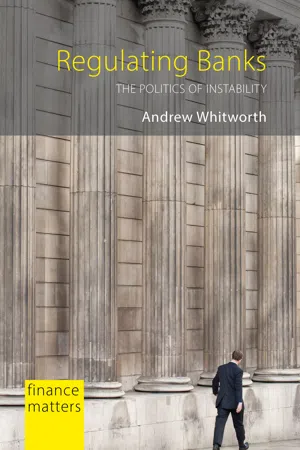
- English
- ePUB (mobile friendly)
- Available on iOS & Android
About this book
Banks have been at the heart of economic activity for centuries, but since the 2008 financial crisis scrutiny of their activities and regulation of their actions has become the focus of fervent academic, policy and political activity. This focus takes for granted the existence and nature of banks.
In Regulating Banks, Andrew Whitworth looks one stage deeper to question what a bank really is, and what the implications of that are. He argues that the institutional form of a bank represents the political compromise of a specific time and place - and can therefore change. This has implications for financial stability. Far from creating stability, he argues, the regulatory impulse of policy-makers inevitably leads to greater financial instability.
Whitworth examines the postwar period of UK banking to show how regulation influences the nature of banks as much as their behaviour. Regulation, by changing the nature of what is regulated, encourages banks and other actors over time to alter their behaviour, which leads to future boom and bust cycles. These cycles then require further regulation to rein in the disruption their new pattern of behaviour inevitably instigates.
Regulating Banks reveals the cyclical nature of banking regulation, the inherent mismatch between political impulses and market reactions, and the price banks, banking and society pay for such instability.
Frequently asked questions
- Essential is ideal for learners and professionals who enjoy exploring a wide range of subjects. Access the Essential Library with 800,000+ trusted titles and best-sellers across business, personal growth, and the humanities. Includes unlimited reading time and Standard Read Aloud voice.
- Complete: Perfect for advanced learners and researchers needing full, unrestricted access. Unlock 1.4M+ books across hundreds of subjects, including academic and specialized titles. The Complete Plan also includes advanced features like Premium Read Aloud and Research Assistant.
Please note we cannot support devices running on iOS 13 and Android 7 or earlier. Learn more about using the app.
Information
Table of contents
- Cover
- Title Page
- Copyright Page
- Table of Contents
- Acknowledgements
- 1. Introduction: what is a bank?
- 2. The financial-regulatory cycle
- 3. Other ways of banking: the UK experience, 1945–70
- 4. Competition and Credit Control and the secondary banking crisis
- 5. The Banking Act 1979 and Johnson Matthey Bankers
- 6. Returning to the question: how the financial-regulatory cycle creates financial instability
- 7. The City revolution, 1987 Banking Act and two international bank failures
- 8. New Labour reforms and the 2008 financial crisis
- 9. The post-crisis response
- 10. Conclusion: banking regimes
- Notes
- References
- Index